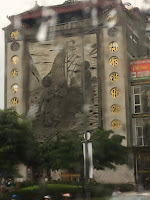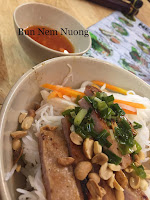Saigon doesn't judge you. Saints and sinners operate in harmony next to each other, five-star professional spas serving expensive tea next to "happy ending" parlors with pushup bras. Due to liberal zoning laws, Saigon (aka Ho Chi Minh) is vibrant, thriving, and free--the kind of city I imagined, wrongfully, that similarly-zoned Houston, Texas would be.
On the bus from the airport to my hotel, I saw a beautiful Buddhist pagoda,
 |
| Photo taken through bus window in the rain. |
a high school named after French scientist Marie Curie, and a mosque next to 24/7 cafes and expensive car dealerships. The next day, while walking around, I saw a Hindu temple
and a French-style Catholic church near the overrated Ben Thanh market.
By way of comparison, I remember lots of fast-food outlets and big box retailers in Houston, TX and not much else. Yet, Houston is supposed to be capitalistic and laissez-faire, with Saigon playing the prodigal Communist. How did we get to the point where Republican-supported "free markets" created a forgettable city most notable for its hybrid highway/freeway system while Chinese-backed Communism led to small business nirvana?
Vietnam is the 50th country I've visited. I looked forward to this trip because I enjoy Vietnamese food and am lucky enough to live 20 minutes away from "Little Saigon" aka "Little Vietnam" in San Jose, California. Consequently, nuoc mia (sugarcane juice), bun bo hue,
 |
| Spicy beef soup |
and pho are as familiar to me as Chipotle and In 'N Out. Even so, my "expertise" wasn't always useful. For example, the term "vermicelli" isn't used in Saigon. If you want to try the delicious combination of wet noodles, crunchy peanuts, BBQ chicken, sweet carrots, and herbs, you'll have to request Bun Ga Nuong, though apparently the Saigonese prefer this dish with pork aka Bun Nem Nuong, which, as Allah is my witness, I found out after I ate a bowl.
 |
| It looked like chicken, I swear. |
After learning Vietnamese for "no pork" (khong thit heo/lon), I'll be okay next time, but it's surprisingly difficult to find vegetarian sandwiches (banh mi chay or banh mi trung) anywhere. In general, Saigon's street food is geared towards college kids (they'll eat anything) and not as good as more formal but still casual restaurants. At 1.50 to 2.50 USD a sandwich or 4 USD for a bowl of noodles, the plastic chairs inside residential storefronts are more attractive than sitting on the street to save fifty cents--especially if it rains. (If you don't like broth/soup, try hu tieu khô or bun cha. As far as I can tell, the difference between the two is bun cha has no broth at all, whereas hu tieu khô gives you broth on the side.)
Coffee, of course, is everywhere. Vietnam is second only to Brasil as the leading exporter of robusta beans, and you can't walk a few streets without seeing enterprising individuals with coffee carts. My favorite? Hot egg coffee, though it takes time to make properly and not commonly available. (Apparently, milk was rationed or unavailable during the war, so egg was used as a substitute.)
 |
| Just the right amount of thick froth. Mix aggressively to get the proper balance of coffee and sweetness. |
Saigon's 24/7 hour cafes and medley of individually-owned small businesses give it a vibrancy Western Europe wishes it had, plus additional bonuses: the preference of motorcycles over cars (which reduces traffic); the youth (adults fight wars so their children can live and forget); and the diversity everyone takes for granted.
 |
| From Museum of Vietnamese History. |
Above all, Saigon is a city that refuses to be pretentious, despite its many Mercedes-Benzes. For instance, Bui Vien Street, Saigon's backpacker area, makes Khao San Road in Bangkok feel like a convalescent home.
My hotel happens to be on Bui Vien street, a result of my habit of never turning down a good deal. I'm now sleeping from 4AM to 11AM because my room is next to a club. (On the bright side, I'm steps away from two legit 6 USD/hour foot massage joints, which are less popular than the other kind.)
What do I make of all this, while realizing I haven't seen the more Chinese-influenced, allegedly more sedate north?
First, District 1's frenetic energy means it's not the kind of place new visitors will likely make long-term friends. Everyone is after something, and the smiles you see are most likely a byproduct of your presumed hefty wallet. You'll understand when you get requests for tips 100% of posted prices as if prices, even when posted clearly, are advertising gimmicks. When traveling, I usually try to date someone local, hoping against all odds for something meaningful, but in Saigon, I don't maintain any pretenses--my inability to speak Vietnamese means I'm only able to meet people interested in quid pro quo.
Second, if you pay attention, you'll notice a fiercely independent streak all around you. Traffic lights, not just signals, are suggestions rather than mandates. Sidewalks are acceptable grounds for Vespas and other single-rider vehicles. When the Grab or FastGo app says to turn right, you can be sure your driver thinks he knows a better way.
Even corporations are subject to the rule of local independence--my corporate-branded hotel's logo was placed above the building's original sign, a dual existence defeating the consistency sought by multinational businesses. (In case you're curious, the original name is the one used on Google Maps.)
Even corporations are subject to the rule of local independence--my corporate-branded hotel's logo was placed above the building's original sign, a dual existence defeating the consistency sought by multinational businesses. (In case you're curious, the original name is the one used on Google Maps.)
Third, if you're not too picky, Saigon is like seeing France at a discount. City Hall and the Opera House are French-themed, though adorned with gaudy modern designs that cannot compete with Paris's classy old baroque. For my purposes, I was happy to try frog's legs and escargot at prices I won't pay in Paris. I didn't love either dish, but at least now I know the best part of a snail isn't its larger central mass, which tastes like octopus, but its softer tail, and that frogs have too many bones relative to the meat offered.
Fourth, the War Remnants Museum, a multi-story building which chronicles the Vietnam War in English and Vietnamese, is a must-see. An entire section is dedicated to photojournalists, many of whom died attempting to save the United States from its jingoism.
 |
| From War Remnants Museum. Observe upper-left hand side of plaque. |
Fifth and finally, the black market is strong in Saigon, and international mafias have carved up different areas for themselves. The Japanese, Chinese, and Koreans make lots of money peaceably, as long as you pay your bills. Your massage parlor may be staffed by a delicate-looking 5'1", 50 kg waif, but if any problems arise, she'll call out, and in less than one minute, a much larger, blonde-dyed fellow will appear.
Indeed, the reason Saigon isn't filled with boring shopping malls pockmarking every other major SE Asian city's skylines is because real estate developers and other rentiers can make stable incomes from tenants of uncertain provenance. Such businessmen have created diverse revenue sources, often 24 hours a day, directly improving the livelihoods of legitimate outfits, especially restaurants and local markets. By way of example, one of the local McDonald's is open 24 hours a day, a feat difficult to accomplish without black market magic, even accounting for worldwide brand recognition and hordes of MBAs.
 |
| The brightly-lit top panel says 24 hours. |
As someone who doesn't smoke or drink alcohol, I'm always surprised non-partakers don't want to legalize and tax so-called "sin" products. Governments need revenue to try to match the much faster-paced private sector and though governments almost never succeed in stamping out illicit activities, absent a counterbalancing force, the average citizen is wholly dependent on mafias agreeing to regulate themselves.
Personally, I'd prefer the revenue for regulation come from products I don't use, which makes me question devout opposition against legalization. Do religiously-inclined people like paying higher taxes? Are they overly optimistic about their local beat cop's desire or ability to eliminate the supply and/or demand for illicit products, which has led to a tacit acceptance of zones where drugs continue to be sold, thereby promoting ghettos? Do they want a police state where armed cops on every corner engage in 24/7 surveillance to ensure proper compliance? Maybe they like the idea of foreigners with more lax attitudes towards acceptable businesses making money that could otherwise go to local citizens? Or perhaps they believe making something illegal automatically removes it from their neighborhoods? Pray tell, what argument against legalization succeeds in light of available evidence, which shows the perennial cat-and-mouse game between police and mafia has failed to accomplish something other than more propaganda, more fear, and more revenue diverted to authoritarianism?
It's become cliché to discuss Anthony Bourdain's love for Vietnam when discussing SE Asian travel, but I'll do it anyway:
Going to Vietnam the first time was life-changing for sure; maybe because it was all so new and different to my life before and the world I grew up in. The food, culture, landscape and smell; they’re all inseparable. It just seemed like another planet; a delicious one that sort of sucked me in and never let go. (2014)
I'm here to tell you it's all true. Bourdain, who died in France, loved Vietnam because the country was him personified: equal parts angel and devil, sinner and saint, unpretentious and one-of-a-kind. Come hungry.
© Matthew Rafat (2018)
Update: I realized why so many Vietnamese people have residential storefronts, i.e., businesses, often food-related, on the ground floor of their two or three story houses. Vietnam's banking sector is state-owned and credit scores don't exist, meaning people with access to loans are employees with steady paychecks, often government workers. People who aren't government workers and who inherited a home are likely to operate in the informal economy.
Bonus I: someone mentioned today that motorcycles are more popular than cars because parking spaces and lots in Saigon are almost non-existent.
Bonus II: much of the Communist appeal--and its attempt to differentiate itself from the superficiality of Western values--revolved around women's equality. It was not uncommon to see women represent family, beauty, and defense, all in one striking image.
Update: I realized why so many Vietnamese people have residential storefronts, i.e., businesses, often food-related, on the ground floor of their two or three story houses. Vietnam's banking sector is state-owned and credit scores don't exist, meaning people with access to loans are employees with steady paychecks, often government workers. People who aren't government workers and who inherited a home are likely to operate in the informal economy.
Bonus I: someone mentioned today that motorcycles are more popular than cars because parking spaces and lots in Saigon are almost non-existent.
Bonus II: much of the Communist appeal--and its attempt to differentiate itself from the superficiality of Western values--revolved around women's equality. It was not uncommon to see women represent family, beauty, and defense, all in one striking image.




